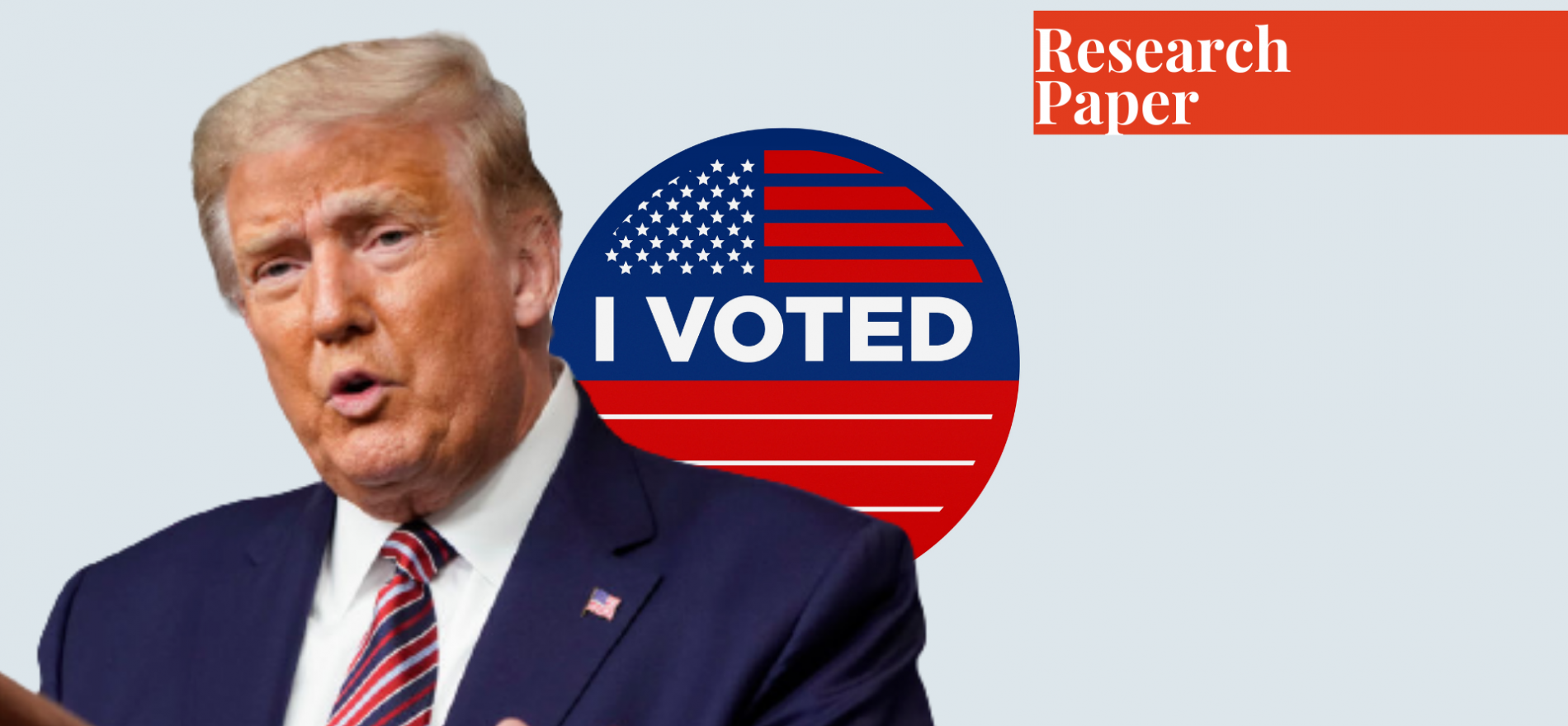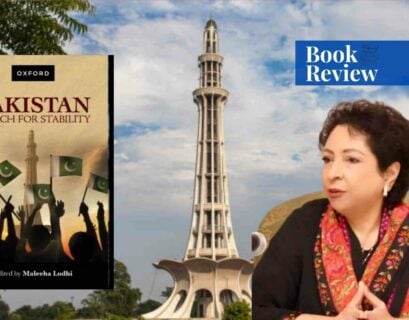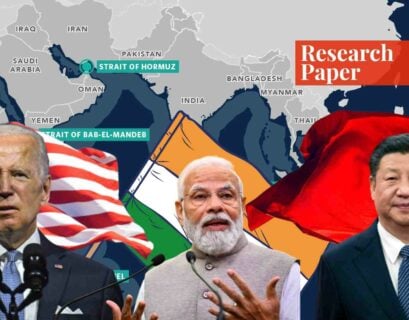Amna recently graduated from Bahria University, Islamabad with a BSS Hons - majors in international relations. Her thesis was titled “Rise of Right-Wing Populism: Comparative Study of Populism in Italy and USA.” She has also completed several internships including interning at the Ministry of Foreign Affairs and also the National Assembly of Pakistan. She aspires to join the Civil Services of Pakistan.
Trump and Populism
It is not a secret that 2016 was considered the year of populism in the U.S. and Donald Trump its apotheosis.1 The presidential elections revolved around the populist rhetoric of Trump and his opponent Bernie Sanders; although less radical and leftist in nature, Sanders, too, was seen as a populist politician. The populist rhetoric is based on the moral vilification of the establishment and the undemocratic elites.
It’s done in a language that is hostile to the rich, providing a radicalized interpretation on the people while denouncing the out of control expenditures of the government on the “free-loaders”, that is, immigrants, minority groups, etcetera.2 Trump’s election campaign consisted of all the above-mentioned ingredients which makes it a successful case study for the rise of populism in the United States.
Trump’s campaign was intrinsically exclusionary and promoted nativism while successfully dividing the people into “us and them”. Economic insecurities that were already existing in the social fabric of the U.S. were intelligently pointed out in Trump’s campaign which attracted much of the white working class, especially those living in the region of Rust Belt — most of the Midwest states in the U.S. — who felt their voices were not being heard by the socio-political elites of the country.
They felt heard and seen for the first time in many years. The fear of being marginalized in their own country and an antagonism against the minorities were the two strong driving forces that brought Trump many loyal supporters. In the constructivist sphere, language and words play a critical role in shaping the image of a leader. In Trump’s case, his speeches and his statements on Twitter played a vital role in shaping his populist rhetoric.
Trump’s Campaign
Trump’s language and his leadership style appeared to be distinctive, separating him from his opponents. His choice of words were simple and understandable, what we may call as the “layman’s terms”. This eventually helped him assert his identity of a common man. Professor Hunston points out that “there is, then, evidence that Trump’s language is highly distinctive, but that this distinctiveness aligns him with scenarios of casual conversation. Although his language, both in content and in style, is odd for a political leader, it is familiar to his audience. It is the true language of populism”.3
Trump’s most used medium of communication during his election campaign was social media, Twitter in particular, which proved to be fruitful as in January 2016 about 44% of people had reported using social media as a source of information regarding the 2016 U.S. presidential elections. By choosing Twitter, Trump’s campaign revolved around personal opinion rather than official statements.
Trump’s extensive use of Twitter helped him reach his voters effectively. He had more following on this medium as compared to the other two candidates (30% more followers than Clinton and almost 60% more than Sanders). The tweets comprised mainly of critiques with little or no focus on the actual manifesto of the party. The presidential campaign for Trump was smartly designed as it limited communication to short and direct statements.
Similarly, the use of official press releases was also minimal as compared to his opponents. Fewer statements were issued on his behalf, usually containing only one or two paragraphs, providing vague ideas on his policy position. This enabled Trump to limit the public’s access to detailed and clear policy positions and the future plan of action of his administration.4 Throughout the campaign his populist rhetoric surfaced, making him the talk of the town.
The media worldwide covered his campaign notwithstanding the fact that media and press itself were highly criticized by Trump and often called “the fake news”. Some favored his America first ideology while the others saw it as a threat to existing the liberal order, nevertheless, trump did manage to get the attention of the whole world regardless of his ignoramus statements.
The Desired Identity
Trump managed to create his identity as the leader who would become the voice of the white working class. A leader who could crackdown on illegal immigration and provide millions of Americans with their desired jobs. Populism was not just limited to his political campaign but has continued to exist after his historical victory as he became the 45th president of The United States of America.
Trump’s political style made him appear non-political, and someone who a common American citizen could relate to. Here lies the irony of populism, how it makes a billionaire look like a common man. According to scholars, the politicians that use populist rhetoric usually see themselves as political outsiders. They view themselves as ones who are alien to the existing political system, a non-elite, and someone a common man could relate to.
Being a political outsider might be true in Trump’s case, since he did lack political experience, but his $2.1 billion net worth took his presumed common man status miles away from him. However, many still saw him as a man who was not afraid to say the truth or what most Americans did not dare to say,5 and emerging as a voice to the so-called marginalized white working class.
In his politics, which has been based on division, he emerged as someone they could rely on, and who was one of them. Trump, without any hesitation, targeted the small groups, minorities, and people of color. His leadership became alarming for the scholars around the globe as support for his populist rhetoric increased. Many scholars believe that populism comes with theatrical elements: it is about the style, the show, and a stage.
A charismatic populist leader who needs fierce crowds, the limelight, usually coupled with a plain-speaking approach that everyone will understand.6 Throughout the campaign and even after winning the elections, this performative element has always been a part of Trump’s politics. He emerged as an ambitious and dominant leader, and mobilization became his greatest tool that was instrumental in rallying and motivating his supporters.
Trump, as a leader, possesses the ability to engage and direct the general public. By virtue of his dominant personality and supreme self-confidence, he managed to win many loyal supporters who trusted his leadership.7 For many, Trump remains a charismatic leader with a volatile temper; a temperament many Americans thought was necessary for an American president to possess in order to stop the influx of immigrants and to save the country’s declining economy.
The Dominant Rhetoric
His straightforwardness, reckless course of action, and lack of empathy in his statements were widely applauded by the Americans who previously felt marginalized by the politically correct elite class, and so began the rise of populism in the United States. Americans believed he was honest and truly a patriot because he spoke about putting Americans and America first. However, this is not patriotism but the politics of division.
Trump’s strong leadership enabled him to sell his right-wing populist rhetoric and despite the criticism by the media and many scholars across the globe, Trump still holds a strong position politically and a place in the hearts of his voters. The constructivist school of thought brilliantly explains how populism has been successful in the creation of identities.
Constructivism explains how words, ideas, and language shape our reality; rhetoric is something similar, anything repeated by the mouth of someone influential is gradually established as the truth in the minds of one’s followers — here, the charisma of leadership plays a vital role. Populist leaders recognize the need for time and what the masses want to hear, and so they will use the exact words that will provoke the masses towards mobilization.
Populist Politics
The construction of identity is vital to populist politics. Populist leaders, like Trump, use the same technique to create identities of “immigrants” as a threat to the U.S. economy. Many eyebrows were raised on his bold statements and his course of actions as he became the president of one of the world’s oldest established democracies. Due to Trump’s reckless statements and an aggressive approach towards foreign policy, the U.S.’s foreign relations came under a strain with several countries.
Trump had to face the music because of his own words. His controversial remarks on the Afghan war in which he very candidly claimed that “he could end the Afghan war in 10 days” but “did not want to kill 10 million people,” raised huge concerns across the globe, considering the lack of empathy in the remarks coupled with a quest for power and hegemony finely concealed in those words.8
For the advocates of liberal democracy, this statement was greatly irresponsible and apolitical on behalf of the President of the United States, a world hegemon who is responsible to uphold the principles of liberalism and lead a peaceful world order. Such statements are uncommon for the political elites of his stature.
On another incident, Trump was seen openly threatening North Korea where he stated, “North Korea best not make any more threats to the United States. They will be met with fire and fury like the world has never seen”.9 His statement reflected the U.S.’s superiority and an urge to maintain the status quo.10 Trump’s leadership style drastically affected the political landscape of the country.
He possesses the ability to mobilize people which proved to be advantageous in spreading his populist agenda across the country and successfully attracted the “forgotten” Americans by inducing fear of “the other” — in Trump’s case, the immigrants and minorities within the United States. His policies and statements display the nationalist side of the United States coupled with American protectionism and nativism.
The entirety of what the U.S. declared repulsive over the decades has now become its reality. Democratic and liberal ideals that the U.S. protected throughout the years are now under threat by no one else but their own president. The right-wing populist rhetoric has always lived in the American political scenario, and Trump clearly recognized it and has used it effectively in his election campaign.
Endnotes
1 Corina Lacatus, “Populism and the 2016 American Election: Evidence from Official Press Releases and Twitter,” PS: Political Science & Politics 52, no. 2 (2019): 223–228, doi: https://doi.org/10.1017/S104909651800183X.
2 Lacatus, “Populism and the 2016 American Election,” 223-228.
3 Susan Hunston, “Donald Trump and the language of populism,” University of Birmingham, accessed October 26, 2020, https://www.birmingham.ac.uk/research/perspective/donald-trump-language-of-populism.aspx.
4 Lacatus, “Populism and the 2016 American Election,” 223–228.
5 Dan Alexander, “Trump’s Net Worth Drops $1 Billion As Coronavirus Infects the President’s Business,” Forbes, April 2, 2020, https://www.forbes.com/sites/danalexander/2020/04/02/trumps-net-worth-drops-1-billion-as-coronavirus-infects-the-presidents-business/#340e4a5c727d.
6 Mark Rice-Oxley and Ammar Kalia, “How to spot a populist?” The Guardian, Dec. 3, 2018, https://www.theguardian.com/news/2018/dec/03/what-is-populism-trump-farage-orban-bolsonaro.
7 Aubrey Immelman, “The Leadership Style of U.S. President Donald J. Trump,” Unit for the Study of Personality in Politics, Working Paper 1.2, Saint John’s University, 2017, https://www.researchgate.net/publication/312771718_The_Leadership_Style_of_US_President_Donald_J_Trump
8 “Kabul seeks clarification after Trump’s comment on Afghan war”, Al Jazeera, July 23, 2019. https://www.aljazeera.com/news/2019/7/23/kabul-seeks-clarification-after-trumps-comment-on-afghan-war
9 Jacob Pramuk, “Trump warns North Korea threats ‘will be met with fire and fury’,” CNBC, Aug 8, 2017, https://www.cnbc.com/2017/08/08/trump-warns-north-korea-threats-will-be-met-with-fire-and-fury.html
10 Hunston, “Donald Trump,”.
If you want to submit your articles and/or research papers, please check the Submissions page.
The views and opinions expressed in this article/paper are the author’s own and do not necessarily reflect the editorial position of Paradigm Shift.



















